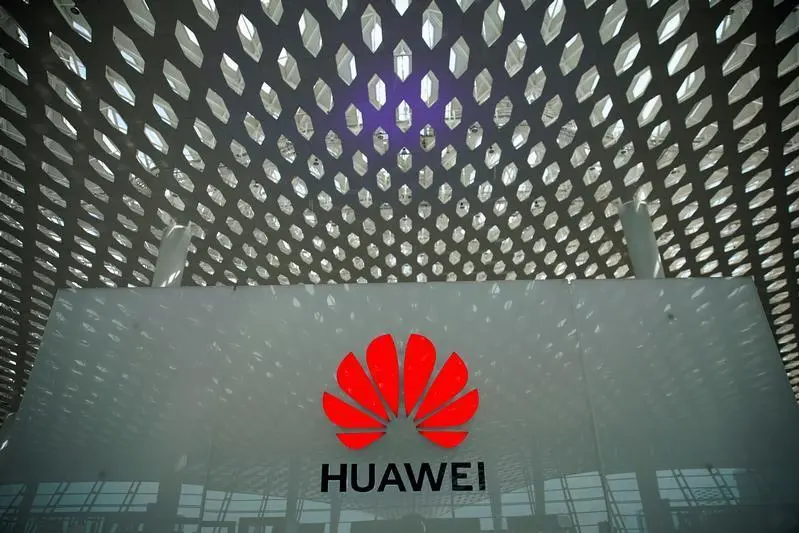PHOTO
BEIJING - It's taken Huawei just four years to become a force in smart car technology, navigating the devastation of trade sanctions on its smartphones business while simultaneously developing a driver assistance system that is the darling of the Beijing auto show.
Huawei Technologies has two huge booths at this week's event, and there are at least seven Chinese automakers touting its Qiankun installed in their cars as the most sophisticated advanced driving assistance system (ADAS) to date.
Even Germany's Volkswagen will equip its China-made, China-bound Audi Q6L e-tron with Qiankun upon the car's 2025 launch, in Huawei's first deal with a foreign automaker, two people with knowledge of the matter told Reuters.
Nissan CEO Makoto Uchida's interest was piqued too as he visited a Huawei booth and listened to representatives explain the systems developed for the Seres car on display.
A Nissan spokesperson said Uchida was touring booths and had no comment on any considerations of a Huawei tie-up. Audi said it does not comment on suppliers.
Huawei did not immediately respond to a request for comment.
Huawei's rapid emergence as parts supplier highlights the telecommunications equipment maker's drive for sources of growth after U.S. export controls pursued on national security grounds since 2019 hammered its businesses, especially smartphones.
It has said it aims to become a top-tier automotive supplier for the intelligent EV era, competing with the likes of Bosch , Denso and Continental .
"We have grown side-by-side with Huawei for three years, and our achievements are obvious to all. We will continue to work side by side for the next three years and more," said Chairman Zhang Xinghai of Dongfeng-backed Seres, whose Aito ranked sixth among new energy brands in China in the January-March quarter.
BOOSTING COMPETITIVENESS
Huawei's market entry has been smoothed by the sheer pace of development in the industry, with legacy automakers struggling to keep up with EV manufacturers such as BYD who are packing one-time premium features into cars as cheap as $20,000.
Private EV makers like BYD have proven adept at developing high-tech capability in-house, whereas state-owned stalwarts have struggled to innovate and so count on the likes of Huawei to boost competitiveness, analysts said.
State-owned Changan , Dongfeng and BAIC are fighting back with new EV brands such as Avatr, VOYAH and Arcfox, all equipped with Huawei's ADAS. Guangzhou Automobile (GAC) will also launch flagship models under its Trumpchi brand from 2025 featuring Huawei's smart vehicle technology.
"Huawei is currently leading in ADAS technologies," GAC General Manager Feng Xingya told reporters on Thursday. "We chose them because we must make sure GAC products are equipped with the most advanced technologies for consumers."
Three managers at foreign automakers said Huawei is seen as a potential partner worth serious consideration for foreign brands in China despite difficulties with Western governments.
That it can make its own chips raises its appeal, as decoupling could see further trade restrictions which would otherwise impact China strategies, the managers said. Automakers "may end up partnering with Chinese firms to provide driving automation for the vehicles targeting the Chinese markets. Huawei can benefit from such opportunities whereas other ADAS providers, e.g., Bosch, may not have them in China in the same way they have them in Europe or the U.S.," said Evangelos Simoudis, an investor and corporate adviser.
SUPPLIER OR RIVAL
However, Huawei has been heavily involved in the development and promotion of Seres Aito and other vehicles, which the three managers and a fourth person said has raised concern in the industry that Huawei is not only a supplier but also a rival.
The company also had a computing component supply crunch this year that delayed deliveries of flagship models including the Seres Aito M9, Changan Avatr 12 and Chery Luxeed S7.
Beyond China, Huawei could again find itself impacted by trade restrictions as the U.S. this year began investigating whether Chinese vehicles are a national security risk, particularly due to concern about "connected" car technology.
None of Huawei's automaker partners have announced plans to export models equipped with Huawei technology. Other technology Huawei showed off at the auto show included vehicle control units that calibrate ride and suspension, LIDAR, telematics sensors using BeiDou and GPS navigation, optical sensors and an audio system built into head rests so occupants can enjoy different music without disturbing each other.
(Reporting by Zhang Yan, Kevin Krolick and Brenda Goh; Additional reporting by Sophie Yu and Daniel Leussink; Editing by Christopher Cushing)





















